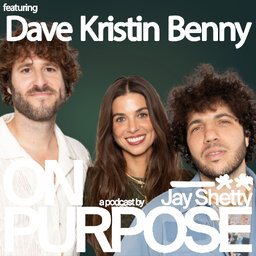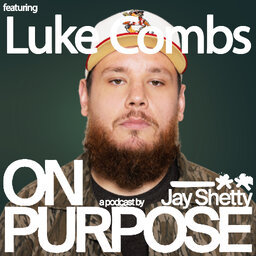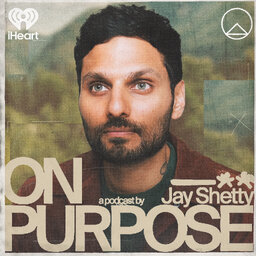Simu Liu ON: Letting Go of Your Parents' Expectations & How to Find the Courage to Fail Until You Succeed
Do you want to meditate daily with me? Go to go.calm.com/onpurpose to get 40% off a Calm Premium Membership. Experience the Daily Jay. Only on Calm
Jay Shetty sits down with Simu Liu to talk about his parent’s immigrant story and how he was able to pursue his passion despite everyone’s expectations from him. One thing that has killed a lot of dreams is fear. The fear of people not supporting us throughout the journey, the fear of being not good enough, the fear of not being able to become the person that you want to be is something that hinders a lot of people from achieving their goals in life. But what do you think would happen if you actually stop being afraid and start trying?
Simu Liu made history as the star of the first Asian-fronted movie in the Marvel Cinematic Universe in Destin Daniel Cretton’s Shang-Chi and the Legend of the Ten Rings, which garnered him The People’s Choice Award for Favorite Action Movie Star. Simu also starred in the Award winning CBC/Netflix comedy series Kim’s Convenience, which won the ACTRA Awards for Outstanding Ensemble in 2017 and Best Comedy Series at the 2018 Canadian Screen Awards. It was the first Canadian television series with an all-Asian lead cast, the series chronicles the day-to-day micro-dramas encountered by a Korean immigrant family that runs a corner grocery store. He wrote his very first book, We Are Dreamers: An Immigrant Superhero Origin Story, which tackles his struggles with parental expectations and stereotypes.
Want to be a Jay Shetty Certified Life Coach? Get the Digital Guide and Workbook from Jay Shetty https://jayshettypurpose.com/fb-getting-started-as-a-life-coach-podcast/
What We Discuss:
- 00:00 Intro
- 06:30 Simu’s famous 2018 tweet & how he started to pursue his acting dream
- 11:11 Simu’s relationship with his parents
- 17:48 Understanding our parents sacrifices
- 20:55 How different parenting was in Simu’s home
- 25:40 Why Simu’s parents hate the way he writes the book
- 29:05 How he repaired & amended his relationship with his parents
- 37:58 Bringing in your parents into the journey that they can understand
- 39:35 Simu’s business background
- 44:12 Giving your own self the validation that you need
- 47:09 Identifying the things that you can control
- 53:35 Simu’s Final Five
Episode Resources
- Simu Liu | Instagram
- Simu Liu | Twitter
- Simu Liu | TikTok
- We Were Dreamers
In 1 playlist(s)
On Purpose with Jay Shetty
My name is Jay Shetty, and my purpose is to make wisdom go viral. I’m fortunate to have fascinating …Social links
Follow podcast
Recent clips

BENNY BLANCO, DAVE BURD & KRISTIN BATALUCCO: Friends Keep Secrets… Or Do They? (Friendship, Weddings, Love)
1:27:16

LUKE COMBS: The Man Behind The Success (Marriage, Fatherhood & Life With OCD)
1:43:07

Don't Waste Your Life (Use THIS Daily Shift To Build a Life That ACTUALLY Feels Meaningful)
21:42
 On Purpose with Jay Shetty
On Purpose with Jay Shetty